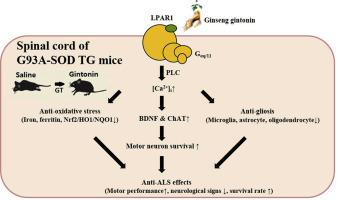当前位置:
X-MOL 学术
›
J. Ginseng Res.
›
论文详情
Our official English website, www.x-mol.net, welcomes your
feedback! (Note: you will need to create a separate account there.)
Ginseng Gintonin Alleviates Neurological Symptoms in the G93A-SOD1 Transgenic Mouse Model of Amyotrophic Lateral Sclerosis through LPA1 receptor
Journal of Ginseng Research ( IF 6.8 ) Pub Date : 2020-05-01 , DOI: 10.1016/j.jgr.2020.04.002 Sung Min Nam 1, 2 , Jong Hee Choi 3 , Sun-Hye Choi 4 , Hee-Jung Cho 4 , Yeon-Jin Cho 4 , Hyewhon Rhim 5 , Hyoung-Chun Kim 6 , Ik-Hyun Cho 3 , Do-Geun Kim 7 , Seung-Yeol Nah 4
Journal of Ginseng Research ( IF 6.8 ) Pub Date : 2020-05-01 , DOI: 10.1016/j.jgr.2020.04.002 Sung Min Nam 1, 2 , Jong Hee Choi 3 , Sun-Hye Choi 4 , Hee-Jung Cho 4 , Yeon-Jin Cho 4 , Hyewhon Rhim 5 , Hyoung-Chun Kim 6 , Ik-Hyun Cho 3 , Do-Geun Kim 7 , Seung-Yeol Nah 4
Affiliation

|
Abstract Background We recently showed that gintonin, an active ginseng ingredient, exhibits antibrain neurodegenerative disease effects including multiple target mechanisms such as antioxidative stress and antiinflammation via the lysophosphatidic acid (LPA) receptors. Amyotrophic lateral sclerosis (ALS) is a spinal disease characterized by neurodegenerative changes in motor neurons with subsequent skeletal muscle paralysis and death. However, pathophysiological mechanisms of ALS are still elusive, and therapeutic drugs have not yet been developed. We investigate the putative alleviating effects of gintonin in ALS. Methods The G93A-SOD1 transgenic mouse ALS model was used. Gintonin (50 or 100 mg/kg/day, p.o.) administration started from week seven. We performed histological analyses, immunoblot assays, and behavioral tests. Results Gintonin extended mouse survival and relieved motor dysfunctions. Histological analyses of spinal cords revealed that gintonin increased the survival of motor neurons, expression of brain-derived neurotrophic factors, choline acetyltransferase, NeuN, and Nissl bodies compared with the vehicle control. Gintonin attenuated elevated spinal NAD(P) quinone oxidoreductase 1 expression and decreased oxidative stress-related ferritin, ionized calcium-binding adapter molecule 1-immunoreactive microglia, S100β-immunoreactive astrocyte, and Olig2-immunoreactive oligodendrocytes compared with the control vehicle. Interestingly, we found that the spinal LPA1 receptor level was decreased, whereas gintonin treatment restored decreased LPA1 receptor expression levels in the G93A-SOD1 transgenic mouse, thereby attenuating neurological symptoms and histological deficits. Conclusion Gintonin-mediated symptomatic improvements of ALS might be associated with the attenuations of neuronal loss and oxidative stress via the spinal LPA1 receptor regulations. The present results suggest that the spinal LPA1 receptor is engaged in ALS, and gintonin may be useful for relieving ALS symptoms.
中文翻译:

人参Gintonin通过LPA1受体缓解G93A-SOD1转基因肌萎缩侧索硬化小鼠模型的神经系统症状
摘要背景我们最近表明,人参活性成分 gintonin 具有抗脑神经退行性疾病的作用,包括多种靶点机制,例如通过溶血磷脂酸 (LPA) 受体的抗氧化应激和抗炎。肌萎缩侧索硬化症 (ALS) 是一种脊柱疾病,其特征在于运动神经元的神经退行性变化,随后骨骼肌麻痹和死亡。然而,ALS的病理生理机制仍然难以捉摸,治疗药物尚未开发出来。我们研究了 gintonin 在 ALS 中的假定缓解作用。方法采用G93A-SOD1转基因小鼠ALS模型。金东宁(50 或 100 mg/kg/天,口服)给药从第 7 周开始。我们进行了组织学分析、免疫印迹分析和行为测试。结果 Gintonin 延长了小鼠的存活率并缓解了运动功能障碍。脊髓的组织学分析显示,与载体对照相比,gintonin 增加了运动神经元的存活率、脑源性神经营养因子、胆碱乙酰转移酶、NeuN 和 Nissl 小体的表达。与对照载体相比,Gintonin 减弱了升高的脊髓 NAD(P) 醌氧化还原酶 1 表达并降低了氧化应激相关的铁蛋白、离子化钙结合衔接分子 1-免疫反应性小胶质细胞、S100β-免疫反应性星形胶质细胞和 Olig2-免疫反应性少突胶质细胞。有趣的是,我们发现 G93A-SOD1 转基因小鼠的脊髓 LPA1 受体水平降低,而 gintonin 治疗恢复了 LPA1 受体表达水平的降低,从而减轻神经系统症状和组织学缺陷。结论 Gintonin 介导的 ALS 症状改善可能与通过脊髓 LPA1 受体调节减轻神经元丢失和氧化应激有关。目前的结果表明,脊髓 LPA1 受体参与 ALS,而 gintonin 可能有助于缓解 ALS 症状。
更新日期:2020-05-01
中文翻译:

人参Gintonin通过LPA1受体缓解G93A-SOD1转基因肌萎缩侧索硬化小鼠模型的神经系统症状
摘要背景我们最近表明,人参活性成分 gintonin 具有抗脑神经退行性疾病的作用,包括多种靶点机制,例如通过溶血磷脂酸 (LPA) 受体的抗氧化应激和抗炎。肌萎缩侧索硬化症 (ALS) 是一种脊柱疾病,其特征在于运动神经元的神经退行性变化,随后骨骼肌麻痹和死亡。然而,ALS的病理生理机制仍然难以捉摸,治疗药物尚未开发出来。我们研究了 gintonin 在 ALS 中的假定缓解作用。方法采用G93A-SOD1转基因小鼠ALS模型。金东宁(50 或 100 mg/kg/天,口服)给药从第 7 周开始。我们进行了组织学分析、免疫印迹分析和行为测试。结果 Gintonin 延长了小鼠的存活率并缓解了运动功能障碍。脊髓的组织学分析显示,与载体对照相比,gintonin 增加了运动神经元的存活率、脑源性神经营养因子、胆碱乙酰转移酶、NeuN 和 Nissl 小体的表达。与对照载体相比,Gintonin 减弱了升高的脊髓 NAD(P) 醌氧化还原酶 1 表达并降低了氧化应激相关的铁蛋白、离子化钙结合衔接分子 1-免疫反应性小胶质细胞、S100β-免疫反应性星形胶质细胞和 Olig2-免疫反应性少突胶质细胞。有趣的是,我们发现 G93A-SOD1 转基因小鼠的脊髓 LPA1 受体水平降低,而 gintonin 治疗恢复了 LPA1 受体表达水平的降低,从而减轻神经系统症状和组织学缺陷。结论 Gintonin 介导的 ALS 症状改善可能与通过脊髓 LPA1 受体调节减轻神经元丢失和氧化应激有关。目前的结果表明,脊髓 LPA1 受体参与 ALS,而 gintonin 可能有助于缓解 ALS 症状。































 京公网安备 11010802027423号
京公网安备 11010802027423号